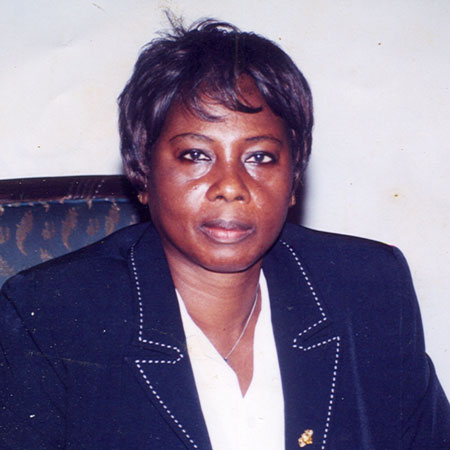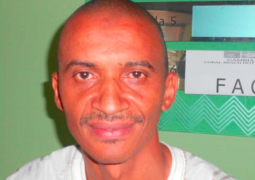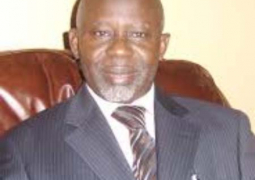
Gamcotrap executive director Dr Isatou Touray, who was recently appointed V-Ambassador for West Africa and coordinator of V-Day One Billion Rising in the region, has spoken on the forthcoming V-Day which is observed annually on February 14.
Dr Touray was speaking on 6 February 2014, at the Gamcotrap office on the event marking the International Day of Zero Tolerance to Female Genital Mutilation.
She said V-Day is all about rising for justice, and justice in 2014 is not just about justice in the homes but justice in offices and everywhere - justice for men, justice for women, justice for families, and justice for everything on earth - because without justice nothing works.
She said they would invite everyone to make a statement and to show solidarity with the young people to make the world a better place, because justice is not only about going to courts but everything that surrounds the human being.
Therefore, she added, the One Billon Rising is not only in The Gambia but the whole world, and it is a form of people relishing their positive energy to show what justice is all about and what they plan to do come February 14.
Dr Touray said further that justice belongs to everybody, even generations yet unborn, and if justice was put in the centre of development it would make the world a better one.
“The International Day of Zero Tolerance to FGM is also a prelude to what is International Day to work on all forms of violence against women and justice for all,” the Gamcotrap executive director said.
Madam Touray said that February 6 is Zero Tolerance Day and it is a global initiative by the Inter-African Committee through the support of the First Ladies, particularly with the leadership of Mrs Stella Obasanjo.
As a result, she said, the day was designated by them for the whole world to understand what the issues are with regard to FGM, and it was important for them to talk about the issues and effects of FGM on women’s health, the rights of child and other aspects, as well as to create awareness among the population about the fact that FGM has nothing to do with Islam.
“Islam is a religion of compassion, a religion of love, and a religion that would ease life for people rather than making it difficult,” she pointed out.
She said Gamcotrap had registered tremendous success across the country as a lot of communities have been reached throughout the country.
Dr Touray further revealed that they have covered at least 4 regions and currently going towards the fifth region through the support of the UNFPA/UNICEF joint programme, the support of Save the Children International, Equality Now and all interested partners, such as the US Embassy, the British High Commission, the EU and other donors nationally and internationally.
“We have been able to reach out to 900 communities, with 128 circumcisers dropping the knife,” she said, adding that they have also experienced 4 dropping of the knife initiatives and now working towards the 5th this year.
With increase advocacy, creating awareness and sensitization and reaching out to various stakeholders like chiefs, women leaders, religious leaders, youth groups, women of reproductive age, and all other actors, they are making impact within the communities and the population at large, the Gamcotrap director said.
She added that they were also able to engage radio stations, particularly Community Radio Stations, who have a package from them using a multi-media package to respond to some of the issues raised by the public regarding FGM and children’s right, as well as FGM and culture.
Their drive on raising awareness and consciousness was very effective and as a result, they have achieved tremendous success, Dr Touray stated.
“We have been able to successfully come up with a draft proposed bill through the Government because as a primary stakeholder, and an interested parties, and also complementing the work of the state, we are taking the responsibility and honour to work as a networking [force] on the bill,” she further said.
She revealed that they have already finished working on the proposed bill and it has been subjected to regional consultations with chiefs, women leaders, and youth leaders.
Other interested parties have looked at it and have given their feedbacks, she went on, adding that they have incorporated them and as far as they are concerned, they have a final document that have been presented to the nation’s Chief Justice and Office of the Vice President, including a copy collected from them by the Office of the Ombudsman.
“I am happy with the trend that have been going on and hopefully we are looking forward to 2014, if a specific bill will be considered, even the proposal we have made,” she said.
People are aware, the doors are opening and people are now coming to Gamcotrap to find out when they were going to the communities, she revealed.
The insults from the community had reduced greatly because people are aware and have been able to get the information right, she stated, saying one of the biggest things she wants addressed is the role of religious scholars from the communities they have reached.
They are well educated and really humble, she said about the chiefs and elders and religious leaders.
“They have realised that this is not in the Holy Quran, so most of them came back to me and told me you are on the right track; go ahead, we agree with you and are going to work closely with you because we thought it was religious injunction,” she explain.
Asked about the challenges they face as an institution in addressing the issue of FGM in The Gambia, she said the challenges are multifaceted in the sense that the type of challenge they use to face was no longer there because the resistance they had at the initial stage was as a result of ignorance of the population about FGM, the effects of FGM and the religious dimension of FGM.
She said even herself she thought it was a religious hurdle at first but knowledge, awareness and research as well as sharing and learning from others through networks brought light and understanding into the initial misconception about the campaign against FGM.
That challenge among religious scholars in the communities they had reached was no longer there, she said, adding that evident had been shown by the dropping of the knife in 4 regions with 900 communities dropping the knife.
She said the communities had the belief that it was religion and they came with their scholars who supported the chiefs, alkalos, and women leaders, to make it clear.
Apart from those challenges, they have not faced any other challenges because people know what the law is all about.
Further asked to elaborate on her role as V-Ambassador for West Africa, Dr Touray said she thinks it was as a result of her increasing engagement in working to push for change in the lives of people, supporting works that people may feel are a little bit sensitive.
“I have been doing a lot of work in terms of advocating for humanity,” she said, adding that she was identified when she was invited for a meeting and as a result asked to coordinate the West African region.
She said she is up to start with The Gambia, Sierra Leone, Guinea Bissau, Senegal and Mali and by next year, she would engage the other countries within the region.
She said she was hoping to popularize the V-Day, talk about the history and what it is all about as well as to animate, encourage, mobilize, organise and share some of the experiences she has learnt from people on how to make people see the concerns of other people.
“If we come together the strength is stronger,” she noted, adding: “When we engage together then we understand each other better.”
Read Other Articles In Article (Archive)



